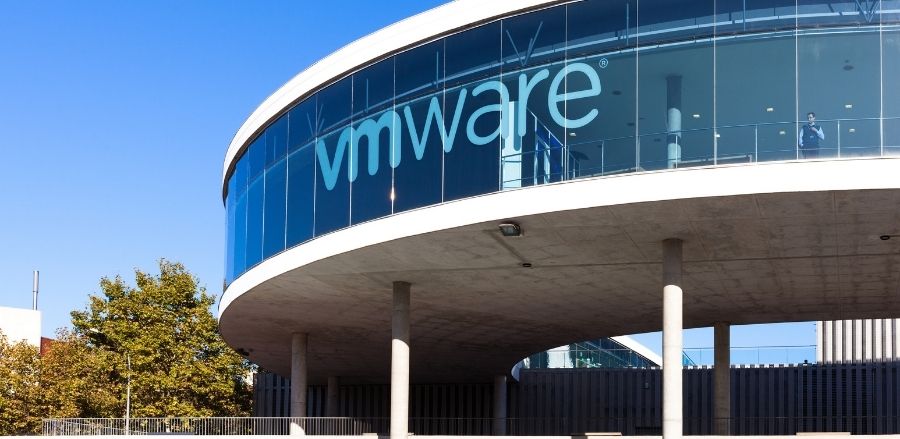
VMware Cloud Foundation Providers: Products, Team, and Future
In 2023, Broadcom, a technology company, acquired VMware and subsequently revamped its partner program to align with new strategic goals – including streamlining VMware Cloud Foundation. The VCSP program, which previously included around 4,500 participants, was replaced by the Broadcom Advantage Partner Program, reducing the total to 500 participants. This reduction distributed participants into two main tiers for Cloud Service Providers (CSPs): 100 Pinnacle Partners and 400 Premier Partners.
This shift, effective as of early 2024, reflects Broadcom’s focus on a more selective, service-oriented partner ecosystem. In this post, we’ll cover the changes to the program, where the final participants list landed, and future opportunities.
Key Points
- In early 2024, Broadcom significantly reduced the number of partners in its program, from about 4,500 to 500, with 100 Pinnacle and 400 Premier partners, invitation only.
- Broadcom optimized the product set, going from 300+ SKUs to VCF and VSF and introduced core commitment requirements: 7,000+ cores for Pinnacle and 3,500+ for Premier entrants.
- Pinnacle and Premier partners now deliver managed services for the offering.
- Pinnacle and Premier partners were able to register and extend the White Label Model offering to be Registered Tier partners. UPDATE: As of this post, Broadcom has officially closed the door on any and all new program entrants. So, the team is set. This comes after two extensions.
- Opus Interactive, a Premier Partner and Registered White Label Provider brings 20+ years of VMware partnership and expertise to the table. This accompanies bespoke colocation, data backup, cloud security and monitoring services. Solutions are tailored to unique workloads and backed by SLA guarantees, HIPAA, PCI DSS, Soc 2 Type 2, ISO 27001 compliance – as well as a 9.4 NPS.
Program Overview
Broadcom transitioned from the VMware Cloud Service Provider (VCSP) program to the Broadcom Advantage Partner Program, impacting how Premier and Pinnacle partners enter and operate. This change aimed to streamline the partner ecosystem, focusing on fewer, more strategic partners.
Entry Criteria Changes
The number of partners was reduced, with specific core commitments now required: Pinnacle partners must commit to 7,000+ cores, while Premier partners need 3,500+ cores. This shift emphasizes larger, more invested partners.
Role and Benefits
Both tiers are expected to offer managed services alongside licenses, distinguishing them from lower tiers like Select/Registered, which focus on reselling. Pinnacle partners receive additional support, such as dedicated marketing managers, while both can participate in White Label programs to collaborate with secondary providers.
Key Changes to Entrants
The changes to Premier and Pinnacle entrants can be categorized into several areas, each with significant implications for eligibility, roles, and operational models. Below, we detail these changes using a structured approach.
Reduction in Partner Numbers
One of the most notable changes is the drastic reduction in the number of partners. Previously, the VCSP program had approximately 4,500 participants globally. The new Broadcom Advantage Partner Program limits this to 500, with specific allocations: 100 for Pinnacle and 400 for Premier. This reduction, as noted in Otava’s Broadcom FAQ (Otava Broadcom FAQ), aims to create a more focused and strategic partner base, potentially increasing the value and support for each partner but also raising barriers to entry for smaller providers.

This table highlights the scale of the reduction, which is a significant shift for the partner ecosystem.
Core Commitment Requirements
A new criterion for entry into the Premier and Pinnacle tiers is the commitment to a minimum number of cores. According to Atomic Data’s article on 2024 VMware licensing (Atomic Data – Understanding 2024 VMware Broadcom Licensing Requirements & Partner Changes), Pinnacle Partners must commit to 7,000+ cores, while Premier Partners need 3,500+ cores. This requirement is tied to the shift toward VMware Cloud Foundation (VCF) and reflects Broadcom’s strategy to work with larger, more capable providers.
This change ensures that entrants have significant infrastructure capacity, aligning with the program’s focus on managed services and subscription-based licensing. It may exclude smaller CSPs, but Broadcom has introduced options like the White Label program to mitigate this, as discussed below.
Program Structure and Role Definition
The Broadcom Advantage Partner Program redefines the roles of Pinnacle and Premier partners, emphasizing managed services over mere reselling. According to Broadcom’s official announcement (Broadcom Official Announcement), Pinnacle Partners are the highest level, requiring extensive certifications, significant sales and service achievements, and broad international coverage. They receive additional support, such as a dedicated Partner Marketing Manager and a Regional Solution Architect.
Premier Partners, on the other hand, are described as having highly-developed VMware practices and a consistent track record of customer satisfaction, with a regional focus and robust sales and service capabilities. Both tiers are expected to offer managed services alongside licenses. This shift underscores Broadcom’s move toward a service-oriented model.
White Label Programs
The introduction of White Label and White Label Plus programs allows Pinnacle and Premier partners to collaborate and support secondary VCSPs. Pinnacle Partners can deliver VMware Cloud Foundation entitlements in a non-branded manner, enabling them to migrate enterprise VMware stacks to their data centers, as per Otava’s FAQ. Premier Partners can participate in White Label Plus, which extends to renewing licenses on existing hardware, providing flexibility for smaller providers not in the program.
This model allows larger CSPs to engage with smaller ones, potentially mitigating the impact of the reduced partner numbers. It represents a new layer of partnership dynamics, expanding the ecosystem’s reach while maintaining visibility and control over core commitments.
Licensing and Pricing Changes
Another critical change affecting entrants was the shift in licensing and pricing models. Broadcom moved from perpetual licenses to subscription-based models, bundling products under VMware Cloud Foundation (VCF), which includes vSphere, vSAN, NSX, and more. Pricing also transitioned from CPU/RAM-based billing to core count-based billing.
The billing change impacts how Premier and Pinnacle partners operate, requiring them to adapt to subscription models and core-based pricing, which aligns with the core commitment requirements.
Timeline and Implementation
The initial transition timeline included key dates such as February 5, 2024, for the partner program transition, and April 30, 2024, for the termination of existing agreements. Other dates, like order submission cutoffs in April 2024, indicate a structured rollout, ensuring partners had time to adjust. The most recent communication marked April 2024 the official closure to any new program registrations, setting the stage for a finalized list of participants.
Implications for Entrants
For Premier and Pinnacle entrants, these changes mean higher barriers to entry due to core commitments and reduced numbers but also increased support and opportunities through White Label programs. The focus on managed services may require investments in capabilities, while the subscription model could affect revenue streams. Smaller CSPs not invited may need to partner via White Label, potentially reshaping the competitive landscape.
Future Opportunities
- Emerging Markets Penetration: The Broadcom Advantage Program is poised to drive growth in emerging markets, particularly in Asia-Pacific and Latin America, where digital transformation is accelerating. VCF’s scalable hybrid cloud capabilities cater to businesses in these regions upgrading IT infrastructure, offering partners opportunities to capture new customers in underpenetrated markets.
- Small and Midsize Enterprise (SME) Expansion: With simplified pricing and white label options, the program is expected to grow by targeting SMEs seeking cost-effective, managed cloud solutions. VCF’s flexibility allows partners to tailor offerings for smaller businesses, a segment increasingly adopting hybrid cloud to compete with larger enterprises.
- AI and Machine Learning Demand: The integration of VMware Private AI Foundation with NVIDIA positions VCF to capitalize on the booming AI market, projected to grow significantly through 2030. Partners can leverage this to expand into industries like healthcare, finance, and manufacturing, where secure, private AI workloads are in high demand.
- Multi-Cloud Management Growth: As enterprises adopt multi-cloud strategies, VCF’s ability to unify management across private and public clouds creates opportunities for market expansion. The program is anticipated to grow by enabling partners to offer multi-cloud orchestration services, appealing to organizations aiming to optimize costs and performance across diverse cloud environments.
- Regulatory Compliance and Sovereignty Needs: With increasing data sovereignty regulations (e.g., GDPR, CCPA), VCF’s on-premises and partner-hosted options align with regional compliance demands. The program is expected to see growth in markets like Europe and the Middle East, where partners can offer localized, compliant cloud solutions to government and enterprise clients.
Conclusion
Broadcom’s changes to Premier and Pinnacle entrants reflect a strategic shift toward a more selective, service-oriented partner program. The reduction in numbers, core commitments, new roles, White Label options, and licensing changes collectively redefine how these partners enter and operate, aiming for a streamlined, high-value ecosystem. This analysis, based on credible sources, provides a detailed understanding for stakeholders navigating these changes.
Key Citations
- Otava Broadcom FAQ details program transition and partner categories
- Atomic Data Understanding 2024 VMware Broadcom Licensing Requirements & Partner Changes details core commitments and White Label
- Broadcom Official Announcement describes new program structure and partner roles
Why Choose Opus Interactive as Your VMware Cloud Partner
Opus Interactive stands out as a cloud service provider ensuring that enterprise customers receive top-notch service and support tailored to their unique needs.
Opus Interactive enterprise customers receive the benefits of:
- 20+ years of VMware partnership
- 9.409 NPS service rating
- 24x7x365 Network Operations Center and client support help desk
- Tier III+ Data Centers
- Full support for hybrid and multi-cloud deployments
For more information, or to get a price quote for white labeling with Opus Interactive, email sales@opusinteractive.com.






